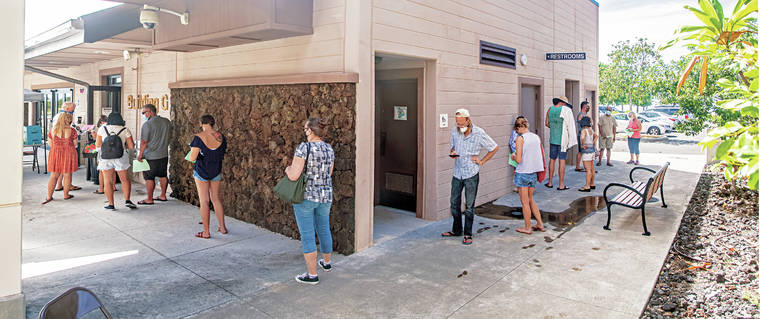Despite a 2020 general election when some Oahu polls closed almost four hours late and some Hilo voters spent three hours in line, the state Elections Commission is sending the Legislature a rosy review in its required biennial evaluation of the conduct of the election.
At a meeting Thursday via Zoom, the commission, already 20 days late in submitting its report, voted to send a report that doesn’t include concerns raised by citizens and groups submitting comments at a meeting last month. The report, under state law, is required to include findings and recommendations from the biennial evaluation.
“I’d like to get this report in,” said Chairman Scotty Anderson. “Yeah, we had a few problems, but it was mostly a smooth election.”
Commissioner Lillian Koller pushed for a delay until comments could be evaluated and included.
“I don’t see any way we as a commission can conclude our report to the Legislature without including the concerns that were raised,” Koller said. “The purpose in our report to the Legislature is not to gush with enthusiasm over a job well done. Our job is to identify what concerns have been expressed within our jurisdiction so the Legislature can take action.”
Commissioner Carol Seielstad disagreed.
“We were just listening to people’s comments,” Seielstad said. “Much of it was hearsay.”
The election, the state’s first all-mail balloting, was generally regarded as a success, especially the primary. Ballots seemed to be mailed out in a timely manner and voters had several choices of returning their completed ballots, including postage-paid return mail, drop boxes and voter service centers.
“We do want to congratulate county election offices and state election officials for a smooth mail-in voting process during a pandemic,” Sandy Ma, executive director of Common Cause Hawaii told the commission.
Her comments were echoed by the League of Women Voters of Hawaii, which praised the “outstanding work” implementing the vote by mail law.
But unprecedented voter registration and turnout, coupled with seeds of mistrust in the mailed system sowed by some political operatives, sent unanticipated numbers of voters to vote in person on Nov. 3. Pandemic safety protocols slowed the in-person voting process as machines had to be sanitized between voters and the number of people allowed inside at any one time was restricted.
“We did notice there were extremely long lines on Election Day and we don’t think this escaped anyone’s attention,” Ma said.
She’s hoping government can provide more voter drop boxes and more voter service centers for the next election.
Other issues raised by testifiers were questions about chain of custody of ballots on Oahu and Maui, whether voter rolls should be purged of lapsed voters meeting certain criteria, signature verification processes and selection of election observers.
“To not be heard or to not have our voices shared would disenfranchise some of the citizens of these islands,” said Laura Nakanelua, national committeewoman for the Republican Party of Hawaii.
State Chief Election Officer Scott Nago, in a Dec. 8 report to the commission, said his recommendations to the Legislature include allowing flexible dates and times for voter service centers and increasing the time lines for voters to receive the ballot and the opening of ballot drop boxes.
“By allowing voter service centers to be established at differing dates and times, the County Elections Divisions may be able to establish additional locations in remote areas or establish more locations on Election Day,” Nago said in his report. “Similarly, by amending the timeline for voters to receive their ballots to be at least 18 days prior to the election, the County Elections Divisions are able to accommodate longer mailing timelines for remote areas, as well as stagger delivery to assist the United States Postal Service.”
In a series of votes, the commission couldn’t get enough of a majority to defer the report until it could study the minutes of the last meeting to pinpoint and relay concerns. Nor did a sufficient majority agree to send the report in as-is. A third motion reached agreement that the report would be sent, including a paragraph saying additional comments may be forthcoming from the commission once it reviews the minutes.
A record 407,190 voters cast their ballot in the 2020 primary election, and 579,784 voters cast their ballot in the 2020 general election, the report noted. It added that “no evidence of fraud or errors were found that would suggest our election had been tampered with.”
“In the end, the 2020 election cycle was largely successful, even in the face of the challenges that COVID-19 brought to the administration of elections,” Anderson said in the 1½-page report. “Many lessons were learned that will help to improve the administration of elections moving forward.”



